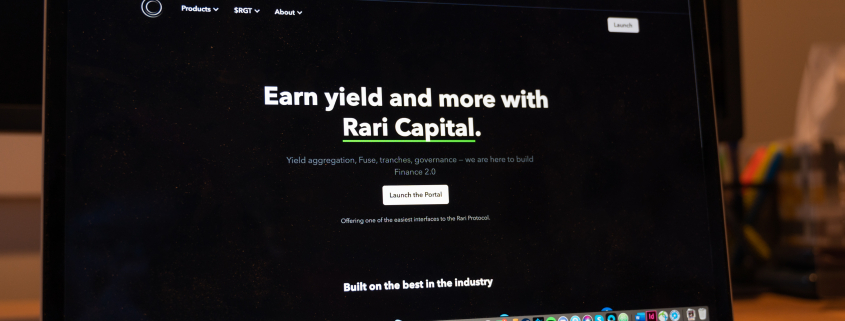IYA freshman co-creates cryptocurrency investment company

Jai Bhavnani was in the shower when he had the idea to build a cryptocurrency investment company. He wanted people to be able to compound their wealth, so with a vision in mind for a start-up, he was inspired to create Rari Capital.
Rari Capital is a start-up that allows users to lend their cryptocurrencies to the company and then receive the highest yield back for their assets without having to go to a bank. Co-founded by Bhavnani, a freshman in the Iovine and Young Academy, UW-Madison sophomore Jack Lipstone and UT Austin sophomore David Lucid, the idea for the company was first developed in late May of 2020 and launched in July 2020.
In simple finance terms, a cryptocurrency is a currency on a blockchain. It’s a type of digital currency where users can use an online platform, one example being the application Coinbase, to turn their USD into USDC (digital dollars), and deposit it to start receiving earnings off of it. It is similar to lending cash to a bank and earning interest off of it.
“At its core, how you differentiate a cryptocurrency from a non-cryptocurrency is whether it is living on top of a blockchain,” Bhavani said.
Before Rari Capital, Bhavnani and Lipstone developed a cryptocurrency mobile wallet called Ambo. Once Ambo was acquired by MyCrypto, another crypto wallet manager company that both founders worked for in 2019, they had a large amount of U.S. dollar-based cryptocurrencies.
Bhavnani wanted to get more money off his cryptos, so he manually lent it out to financial platforms like Dydx and Compound finance. Eventually, he wanted to speed up this process so he could generate more cryptos.
To deposit into Rari Capital, users must connect a crypto mobile wallet (MetaMask, WalletConnect, Portis, Torus, Formatic or Authereum) to access the Rari Capital app landing page. They then choose one of three pools (the Rari ETH Pool Token, Rari Stable Pool Token or Rari Yield Pool Token) to deposit their cryptos in. As users deposit their money into Rari’s pools, their money will go out to providers. Rari takes 17.5% of everything they make off their users as a performance fee cost, Bhavnani said.
As Rari Capital moves into the economic world with nearly 10,000 token holders, they are constantly updating what their company has to offer.
In July, version one was launched, and users deposited a maximum of $350. One hundred seventy users deposited and summed the fund to up to $60,000. Since version one worked, Rari Capital was something the co-founders wanted to continue building, Bhavnani said.
Version two was then released last October, when the co-founders decided to create their own cryptocurrency.
“The cryptocurrency that we’re going to create is going to control this entire network that we’re building, this entire fund that we’re building,” Bhavnani said. “Alongside that, we started giving away our cryptocurrency to anybody that’s deposited into the fund … everybody wanted to deposit into the fund because they wanted a piece of our cryptocurrency … within 72 hours of us launching version two, we had $95 million under management.”
Currently, the Rari Capital team is composed of eight members: the three co-founders, a user experience designer, one front-end developer, one community outreach employee and two smart contract developers. The majority of the workers attended the same high school as Bhavnani and Lipstone.
Since the start-up was formed when everything shifted online, Rari Capital has never existed in a non-Zoom world, so many of the workers have not met each other, Bhavnani said.
Justin Yu, a high school senior and the company’s first hire, said working for Rari Capital is a blessing. The experience of working for an online start-up allows him to try out a wide array of roles such as user interface, user experience design, designing operations and marketing, he said.
“We’ve done about three all-nighters where we cram away working on something for an important deadline,” Yu said.
The team communicates through Slack, and Lipstone said the co-founders are constantly calling each other and texting one another.
“It’s pretty much like a family, that’s what I would call it,” Lipstone said.
The company started with an idea that has grown over the past eight months. Rari Capital’s next steps include developing a product called Fuse. Fuse will allow users to create their own money market, which would allow people to lend and borrow assets at their discretion, said Lipstone.
“I’ve been around effectively as long as the company has been around … We had nothing … There was a bit of a stall trying to get traction, trying to get our name out there,” Yu said. “Now, there’s all sorts of influencers and larger personalities and [people on] Twitter who have thousands and thousands of followers who are tweeting about us, asking for personal pitches and more information, and I think that definitely makes it a much more rewarding experience having seen it from zero to 100.”

